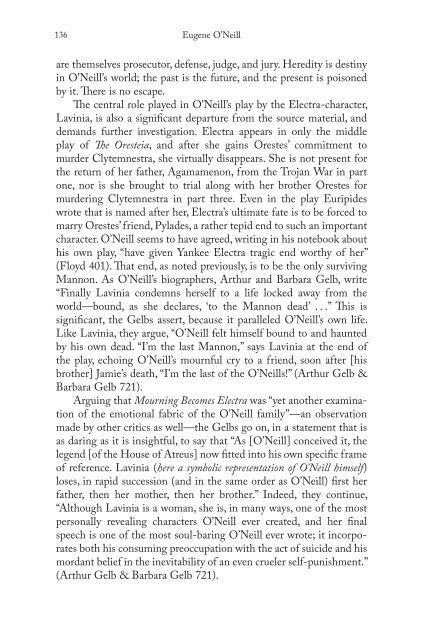Bloom's Literary Themes - ymerleksi - home
Bloom's Literary Themes - ymerleksi - home
Bloom's Literary Themes - ymerleksi - home
You also want an ePaper? Increase the reach of your titles
YUMPU automatically turns print PDFs into web optimized ePapers that Google loves.
136<br />
Eugene O’Neill<br />
are themselves prosecutor, defense, judge, and jury. Heredity is destiny<br />
in O’Neill’s world; the past is the future, and the present is poisoned<br />
by it. There is no escape.<br />
The central role played in O’Neill’s play by the Electra-character,<br />
Lavinia, is also a significant departure from the source material, and<br />
demands further investigation. Electra appears in only the middle<br />
play of The Oresteia, and after she gains Orestes’ commitment to<br />
murder Clytemnestra, she virtually disappears. She is not present for<br />
the return of her father, Agamamenon, from the Trojan War in part<br />
one, nor is she brought to trial along with her brother Orestes for<br />
murdering Clytemnestra in part three. Even in the play Euripides<br />
wrote that is named after her, Electra’s ultimate fate is to be forced to<br />
marry Orestes’ friend, Pylades, a rather tepid end to such an important<br />
character. O’Neill seems to have agreed, writing in his notebook about<br />
his own play, “have given Yankee Electra tragic end worthy of her”<br />
(Floyd 401). That end, as noted previously, is to be the only surviving<br />
Mannon. As O’Neill’s biographers, Arthur and Barbara Gelb, write<br />
“Finally Lavinia condemns herself to a life locked away from the<br />
world—bound, as she declares, ‘to the Mannon dead’ . . .” This is<br />
significant, the Gelbs assert, because it paralleled O’Neill’s own life.<br />
Like Lavinia, they argue, “O’Neill felt himself bound to and haunted<br />
by his own dead. “I’m the last Mannon,” says Lavinia at the end of<br />
the play, echoing O’Neill’s mournful cry to a friend, soon after [his<br />
brother] Jamie’s death, “I’m the last of the O’Neills!” (Arthur Gelb &<br />
Barbara Gelb 721).<br />
Arguing that Mourning Becomes Electra was “yet another examination<br />
of the emotional fabric of the O’Neill family”—an observation<br />
made by other critics as well—the Gelbs go on, in a statement that is<br />
as daring as it is insightful, to say that “As [O’Neill] conceived it, the<br />
legend [of the House of Atreus] now fitted into his own specific frame<br />
of reference. Lavinia (here a symbolic representation of O’Neill himself)<br />
loses, in rapid succession (and in the same order as O’Neill) first her<br />
father, then her mother, then her brother.” Indeed, they continue,<br />
“Although Lavinia is a woman, she is, in many ways, one of the most<br />
personally revealing characters O’Neill ever created, and her final<br />
speech is one of the most soul-baring O’Neill ever wrote; it incorporates<br />
both his consuming preoccupation with the act of suicide and his<br />
mordant belief in the inevitability of an even crueler self-punishment.”<br />
(Arthur Gelb & Barbara Gelb 721).
















